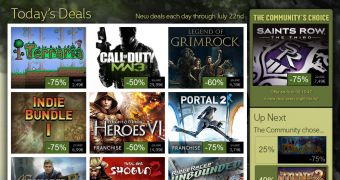Several independent developers, including Runic Games, of Torchlight fame, or Supergiant Games, the studio behind Bastion, have defended the aggressive discount strategies employed by the likes of Valve on its Steam digital distribution service, saying that they end up benefitting their games and profit figures.
The Steam Summer Sale of 2012 has ended and, once again, the debate over whether or not these actual promotions are beneficial for developers and publishers has been revived.
Many companies believe that cutting prices by 50 or 75% cheapens the intellectual property and gets customers used to paying much less than the regular price for a game.
Valve went on the record and said that its statistics showed that sales actually ended up benefitting games and their developers or publishers.
Now, Gamasutra has talked about these aggressive discounts with several independent studios, including Runic Games and its CEO, Max Schaefer, who emphasizes that sales bring in new people to its Torchlight RPG.
"We find that we get several thousand percent increases in units and revenue on the days of the Steam sales, and unit sales are usually about double the normal for a few weeks after the sales are over," the Runic boss said.
Supergiant Games’ Amir Rao is also thrilled about sales on Steam, as it usually means even higher sales figures than when the game, Bastion in this case, was launched for the first time.
"A lot of times we judge the success of a game -- and predict its sales -- by looking at its launch day numbers. Steam sales have made that delightfully impossible. Our launch day [for Bastion], which we viewed as very strong, is only our fifth best day of sales ever on Steam due to the power of the promotions we've had the opportunity to participate in," he said.
Sales also don’t make people put off paying full price for a game, as XSEED’s Ken Berry highlights that those who get them with a discount are actually completely new customers.
"While some may argue that [major sales] contribute to an industry-wide price deterioration problem -- where smartphone games have made people unwilling to spend more than $5 on a digital game -- [Steam sales] are a bit different," he said. "Rather than looking at it as a 'lost sale' when people wait for these Steam discounts, I think it needs to be viewed as reaching out to a new customer that never would have purchased your game otherwise."
Even if some studios may object to selling their games for a lower price, sales, especially on Steam, result in lots of sales, so don’t expect the service to stop making more big discounts.

 14 DAY TRIAL //
14 DAY TRIAL //